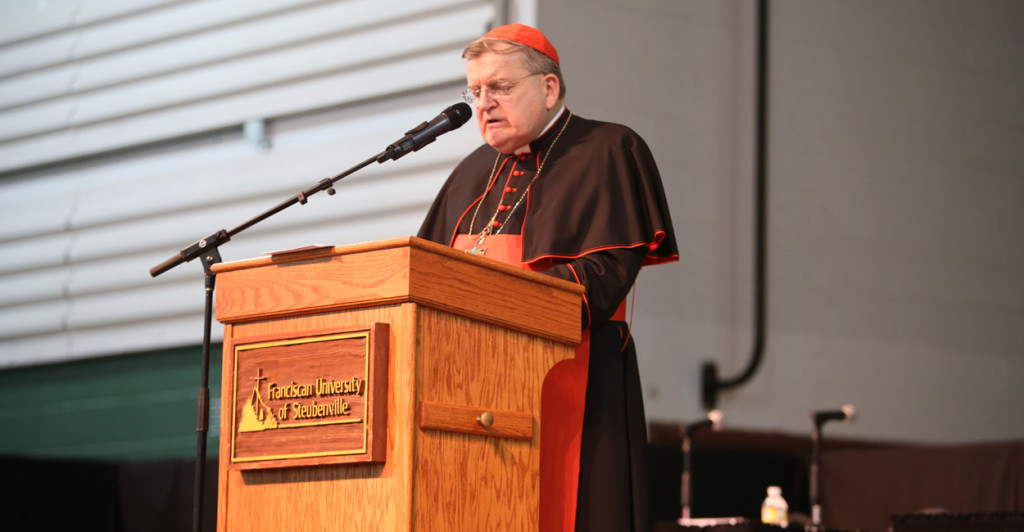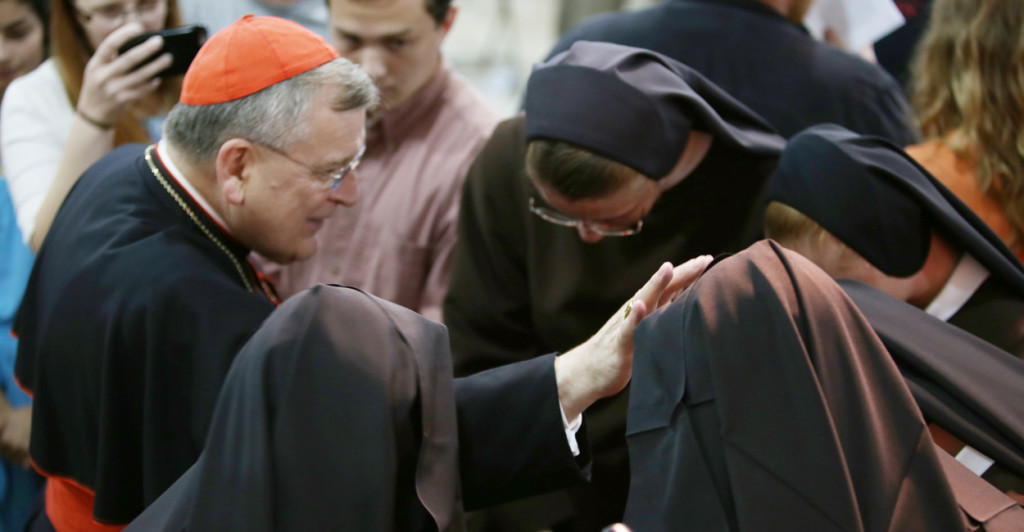How a Catholic Cardinal Is Responding to the Assault on Marriage and Family
Rachel del Guidice /
STEUBENVILLE, Ohio—Pope Francis’s visit to the United States next week will coincide with a meeting of Catholics from all over the world to discuss some of the most pertinent issues facing the church.
For a society that’s become increasingly secularized, the upcoming World Meeting of Families in Philadelphia will be an opportunity for bishops to discuss a number of issues. Students at Franciscan University of Steubenville got a preview earlier this month from Cardinal Raymond Leo Burke. (This story originally—and incorrectly—referred to the meeting as a synod.)
The meeting will cover issues such as broken families and divorced and remarried couples, the transmission of life in regards to declining birthrates, and pastoral care for those with same-sex attraction.
Burke used his speech at this Catholic university in Ohio to discuss attacks on family life and the Catholic Church’s response.
“In the present moment, when the attacks on matrimony and on the family even within the church seem the most ferocious, it is the church who must show to the whole of society the truth in all its richness and, therefore, the beauty and the goodness of marriage and the family,” said Burke.
Burke has fallen under criticism due to his staunch conservative views and accusations of opposition to the pope. Some Italian bishops have even barred him from speaking in their dioceses, and others have claimed that Burke would be supportive of a schism should the outcomes of the meeting be contrary to his convictions.
In response to these accusations, Burke said, “It’s total nonsense; I don’t understand this attitude. … I have never said a single word against the pope; I strive only to serve the truth, a task that we all have.”

Cardinal Raymond Leo Burke addresses students at Franciscan University of Steubenville. (Photo: Andrew Gordon/Franciscan University of Steubenville)
Burke told students at Franciscan University that in the recent attacks against marriage and the family, the first question to be asked is whether sentimentalism or a false compassion has inspired suggestions to modify radically the process for the declaration of nullity of marriage.
He said students must be wary of abandoning natural law and watering down faith and tradition in order to make certain practices acceptable.
“Some have gone too far to assert that the church cannot speak of the natural law, intrinsically evil acts, irregular unions, and so forth. Their point is that the language itself already makes the culture hostile. However, doing so, the church gives the impression of wanting to draw near to the culture but without a clear identity of her own self and of what she has to say to the culture.”
The cardinal urged students to have the strength to listen to and engage in the cultural debate of marriage, but not to forsake their identity in the name of tolerance.
Burke told encouraged students to maintain all dialogue with the utmost honor and respect.
“According to divine wisdom, the church must always speak the truth with love. Yes, the church should go to the peripheries of today’s culture, but always secure in her identity, manifesting the greatest compassion which necessarily involves respect for the truth of the current situation which many times is marked by confusion and error regarding the most fundamental truths of human life and its cradle which is the family.”
In speaking of the attacks against the family, Burke also cited the immoral practices of today’s culture, encouraging the students to remain grounded and steadfast in their faith.
“Disordered sexual activity, sexual activity outside of marriage and the media’s false yet constant and powerful messages regarding our identity as man and woman are all signs of the urgent need of a new evangelization, which begins in marriages, in families, and through marriages reaches the entire culture.”

The cardinal blesses religious sisters. (Credit: Andrew Gordon/Franciscan University of Steubenville)
The address from Burke sparked lively discussion among students on campus. The most common theme has been staying true to faith in society that is increasingly hostile to faith.
“The struggle that I see commonly is a conformity of faith to this world, because we are a loving faith, and it’s hard to love when your friends see it as bigotry and hate,” said Pablo Boteyo, a junior English theology major from Dallas.
Boteyo said being faithful to his religious beliefs in today’s society is a challenge.
“In moments of strife, trials, and tribulation, our call isn’t to run away, destroy, or attack. Rather, our call is to fight for the good of our brothers and sisters. The moment we start fighting for unity with each other, we are looking for the salvation of the community of persons, and in that salvation we also find eternal salvation,” said Boteyo.
Isabelle Farineau, a senior philosophy major from Charlottesville, Va., said she had concerns when it came to the cardinal’s view on faith and dialogue.
“We all believe that we know what is right and true when it comes to matters of our faith, but we have to take time to appreciate that when we address others around us who disagree, it is not because they are unintelligent or liars, it is because they themselves feel as though they have justification for their own claims.”
Farineau went on to say that she believes that in regards to faith and the family, the past should never be fanaticized.
“I’m no enemy of tradition, but idealizing the past without taking time to point out its flaws is symptomatic of a path that may take us back to those same mistakes. That is my biggest fear when it comes to talk about the ‘new emangelization,’ that it will only reproduce these same impossible ideals that push men away from women, and husbands away from their wives and families,” said Farineau.
Another student, Lauren Ramseyer, a senior communication arts major and theology minor from Sidney, Ill., said she is awaiting the meeting with much anticipation and believes that her peers should as well.
“I truly believe that the upcoming World Meeting of Families is a huge moment in the history of the Catholic Church. In our secular society, marriage and the family are being tossed aside as meaningless and useless institutions, filled with simple sentimentality which has stunted the growth of modern man,” said Ramseyer.
Ramseyer said that she believes this meeting to be a golden opportunity for the Catholic Church to clearly restate teachings that are often misunderstood.
“The leaders of the church have not only an opportunity, but a duty to reaffirm the lifelong teachings and doctrine of Catholicism. This is a moment in history where the eyes of the world have converged on the Church to see what action she will take. We must stand true to the natural law and the Catholic teaching on marriage which defines that union between one man and one woman as faithful, enduring and procreative. The sacrament and institution of marriage is the foundation of society, and we must end the secularization of this central union.”
